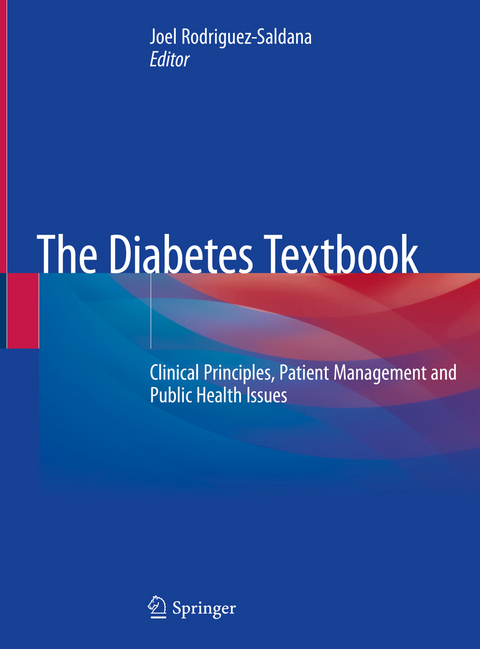
The Diabetes Textbook
Springer International Publishing (Verlag)
978-3-030-11814-3 (ISBN)
Diabetes has become a worldwide health problem, the global estimated prevalence approaches ten percent and the burden of this disease in terms of morbidity and mortality is unprecedented. The advances acquired through the knowledge of the mechanisms of the disease and the variety of therapeutic approaches contrast with the inability of private and public health systems in underdeveloped and even developed countries to achieve the goals of treatment. This paradox has been described in many sources: the surge of scientific advances contrast with an unprecedented amount of human suffering. Thus, a patient centered and an evidence based approach with the capacity to produce measurable clinical and economic outcomes is required.
The purpose of this textbook is multiple: to offer a comprehensive resource covering all aspects of outpatient management; to address diabetes as a health problem from an epidemiological, economic and clinical perspective; to discuss the role of social determinants of health on the worldwide increase in diabetes; to highlight the challenges and obstacles in providing adequate care; and to outline a multidisciplinary approach to management in which medical visits retain their importance as part of a team comprising the patient, his or her family and a multidisciplinary group of health professionals who are able to move beyond the traditional approach of diabetes as a disease and greatly improve outcomes.
Dr. Joel Rodriguez-Saldaña is a certified internist and diabetologist. He was professor of Medicine at the National University of Mexico (UNAM) from 1980 to 2002 and was previously appointed to several professional positions in secondary and tertiary care hospitals in Mexico City. Starting in 1990 he has devoted to develop and implement an effective model of outpatient diabetes care. Since 1995 he has been associated with the International Diabetes Center from Minneapolis to implement Staged Diabetes Management, a structured program devoted to improve the quality of diabetes care. As head of research from 2001 to 2007 in Hidalgo, Mexico, Dr. Rodriguez-Saldaña devised and implemented the state's diabetes program, in 2007 he developed and implemented the national diabetes program at ISSSTE, a social security institution that delivers health care to government employees in Mexico and in 2008 he received a grant from Instituto Carlos Slim de Salud to implement and pilot test the Chronic Disease Model for prevention and management of diabetes and cardiovascular risk factors with unprecedented levels of effectiveness in Mexico. Dr. Rodriguez-Saldaña was the former medical president of the Mexican Diabetes Federation and his professional memberships include the American College of Physicians, the American Heart Association, and the American Association of Diabetes Educators. He has delivered lectures on diabetes, cardiovascular risk factors and geriatrics in Mexico, the United States, Canada and South Africa. He has received 35 professional awards, including the first "Donell D. Etzwiler" for achievements in diabetes care, the Pan-American Health Organization, and the American Association of Diabetes Educators. He has co-authored 10 books and guidelines about diabetes, and has published 31 articles in Mexican and international peer reviewed journals. Since 2003 he is the General Director of REMEDI and has established Multidisciplinary Diabetes Centers in Mexico City, Pachuca and Reynosa and a statewide program in Tlaxcala, devoted to improve the quality of health care in Mexico and Latin America through outpatient diabetes care, continuing medical education, and clinical research.
lt;p>Introduction: A New Disease?.- Section 1 Magnitude of the Problem from an Individual and Social Context.- The Dynamics of Diabetes Prevalence, Morbidity and Mortality.- Economic Costs, from Individuals to Health Systems: Evidence from a Middle Income Country.- The Ecological Approach to Self-Care in Diabetes.- Social Determinants of Health and Diabetes Outcomes.- Section 2 Diagnosis, Classifications and Mechanisms of Disease.- Definition, Diagnostic Criteria, Screening, Diagnosis and Classification of Diabetes and Categories of Glucose Intolerance.- Pathophysiology of Type 1 Diabetes.- Pathophysiology of Type 2 Diabetes.- Genetic Determinants of Type 2 Diabetes.- Gene Expression Modifications in Type 2 Diabetes.- The Immune System and Inflammation in Type 2 Diabetes.- Dysfunction and Death of Pancreatic Beta Cells in Type 2 Diabetes.- Obesity in the Pathophysiology of Diabetes.- Pathogenesis of Gestational Diabetes.- Non-Alcoholic Fatty Liver in the Pathogenesis of Diabetes.- Section 3 Global Experiences in Diabetes Care.- Diabetes Management in Europe.- Diabetes Management in Asia.- Diabetes Management in the United States.- Diabetes Management in Africa.- Section 4 Basic Components of Management: Patient Centeredness, Evidence-Based Medicine and Outcomes. Challenges for Implementation.- The Patient-Centered Medical Home, Primary Care and Diabetes.- Outpatient Diabetes Management and the Chronic Care Model.- Clinical Practice Guidelines for Diabetes.- Quality of Diabetes Care: Measuring Clinical Impact, Cost Effectiveness and Patient Experience of Care.- Clinical Inertia in Diabetes: The Role of Physicians.- Patient Adherence in Diabetes: Challenges, Myths and Realities.- Section 5 Resources of Support for Persons with Diabetes.- Challenges and Opportunities in Diabetes Education.- Diabetes and Mental Health: From Distress to Depression.- Tools of Self-Care: Self-Monitoring of Blood Glucose and Tele-health Resources.- Continuous Glucose Monitoring and Clinical Decision Making.- Diabetes and Lifestyle Medicine.- Evidence and Implementation of Nutrition Therapy in Persons with Diabetes.- Evidence and Implementation of Physical Activity and Exercise.- Section 6 Drug Therapy.- The "Old" Oral Antidiabetics.- Incretin Therapies: Current Use and Emerging Possibilities.- Sodium Glucose Transporter Inhibitors.- Insulin in Outpatient Diabetes Management.- Insulin Pump Therapy.- Section 7 Cardiovascular Risk Factors.- Diabetes and Hypertension.- Diabetes and Atherogenic Dyslipidemia.- Diabetes and Obesity.- Diabetes and Smoking.- Section 8 Acute Complications.- Hyperglycemic Crisis: Diabetic (ketoacidosis (DKA).- Hypoglycemia: Diagnosis, Management and Prevention.- Inpatient Management of Diabetes and Hyperglycemia.- Diabetes and Infection.- Section 9 Chronic Complications.- Diabetes and Stroke: The Role of Glucose Regulation.- Diabetes and Peripheral Artery Disease.- Biochemical and Molecular Mechanisms of Vascular Complications in Diabetes.- Ophthalmologic Eye Disease.- Diabetes and Oral Health.- Renal Disease in Diabetes.- Peripheral Diabetic Neuropathies.- Diabetic Cardiac Autonomic Neuropathy.- Autonomic Visceral Neuropathy and Gastrointestinal Disorders.- Urologic Complications and Sexual Dysfunction.- Musculoskeletal Complications of Diabetes.- Diabetes and the Skin.- Foot Complications.- Diabetes and Cancer.- Section 10 Diabetes in Special Populations.- Children and Adolescents.- Pregnancy: Pregestational and Gestational Management.- The Elderly with Diabetes.- Section 11 Diabetes Prevention.- Prevention of Type 2 Diabetes: Evidence and Challenges.- Section 12 Novel Therapeutic Approaches: Evidence-Based and Others.- Insulin Pumps and Closed Loop Systems and the Artificial Pancreas.- Unproven Therapies for Diabetes.
| Erscheinungsdatum | 25.09.2019 |
|---|---|
| Zusatzinfo | XX, 1040 p. 212 illus., 183 illus. in color. |
| Verlagsort | Cham |
| Sprache | englisch |
| Maße | 210 x 279 mm |
| Gewicht | 3905 g |
| Themenwelt | Medizinische Fachgebiete ► Innere Medizin ► Diabetologie |
| Schlagworte | Chronic Disease • Diabetes • Diabetes mellitus • Multidisciplinary Management • quality of health care • Treatment |
| ISBN-10 | 3-030-11814-2 / 3030118142 |
| ISBN-13 | 978-3-030-11814-3 / 9783030118143 |
| Zustand | Neuware |
| Informationen gemäß Produktsicherheitsverordnung (GPSR) | |
| Haben Sie eine Frage zum Produkt? |
aus dem Bereich



